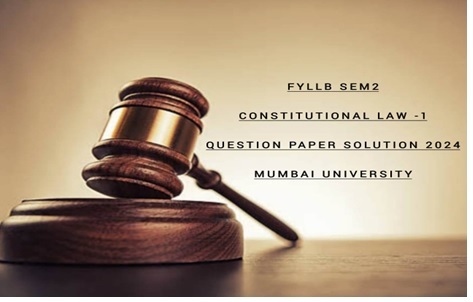Answer in two sentences & situational questions FYLLB 3 years

Q.1 Answer in two sentences ( Any six )
a) Explain any two feature of the Government of India Act 1935.
Ans: The act divided the powers between the central and units in term of three lists, federal list, provincial list and concurrent list. the Act abolished dyarchy in the provinces and introduced provincial autonomy in its place.
b) When Writ of certiorari can be enforced?
Ans: writ of certiorari means “ to be more fully informed.” This writ issued by the superior court to the inferior court. Where there is a violation of the principle of natural justice, or if there is an error of law this writ is then used to review and quash the decision of tribunal or lower court.
c) Explain any four Fundamental Duties.
Ans: 1. To abide by the constitution, respect its ideals and institution, the respect National Flag and the National Anthem.
- To cherish and follow the noble ideas Which inspired our national struggle for freedom.
- To uphold and protect the sovereignty, unity and integrity, of India.
- To promote the harmony amongst all section of the people
d) What is Ex Post Facto Law?
Ans: it means that a person’s action cannot be termed as ‘crime’ by a law which is passed after the said action has taken place
FYLLB 3 years SEM2 CONSTITUTONAL LAW
e) What do you understand by uniform civil code?
Ans: uniform civil code (UCC) comes under the Article 44 of the Indian constitution. Which is the proposal to replace India’s varied personal law. Like Hindu are govern by Hindu law, Muslim are govern by Mohammedan law, moreover there are separate matrimonial law for the christen and the Parsees by uniform civil court.
f) What is traffic in human being and beggar as per Article 23 of the Indian constitution?
Ans: traffic in human is form of slavery and means buying and selling the men, woman and children for immoral purpose. Beggar means of forced labor under which a person is compelled to work without receiving any remuneration.
g) What is judicial Review?
Ans: judicial review means the right of the court to review law passed by the legislature and order issued by the executive and declare null and void if they violated the provision of the constitution. On the other hand judicial review means that courts of law have power of testing the validity of legislature as well as other government action.
h) What is secularism?
Ans: the word “secular” was inserted into the preamble by the 42nd Amendment Act of 1976. Secularism means every person is equal in the eyes of law. They has the right to preach, practice and propagate any religion she/he want to. The government must not discriminate against any religions. it must treat all religions with equal respect.
FYLLB 3 years course situational questions-answer

Q.2 situational questions (Any two)
A) Mr. A an editor of a newspaper, writes anti- governmental article. the police commissioner issued an order to Mr. A for submitting all his article for scrutiny before they are published.
- Are these restriction valid?
Ans:- No. this restriction are not valid.
According to the Article 19(1)(a) Indian constitution the person have right to freedom of speech and expression.
Here the police commission doesn’t have any right to imposed restriction and issue order to him for submitting his article. Pre censorship of any magazines &newspaper is unconstitutional and struck down by the supreme court. Pre censorship of newspaper violates the Mr. A freedom of speech and expression under the Article 19(1)(a) of the Indian constitution.
2. Does this order infringe any fundamental right of Mr. A? if Yes, what remedies does he have?
Ans : Yes. This order infringe fundamental right of Mr. A under 19 (1) (a) of the constitution.
Mr. A can file writ petition in Hight court under Article 226 or supreme court under article 32.
FYLLB 3 years SEM2 CONSTITUTONAL LAW
B) Vidya, a renewed environmental activist, is arrested by the state police for organizing a peaceful protest against the construction of a controversial dam that threatens to displace several indigenous communities and harm the local ecosystem. Vidya argues that her arrest is a violation of her constitutional right to freedom of speech and expression, as she was merely exercising her democratic right to dissent against environmental injustices.
- In light of the circumstances presented, what legal arguments might vidya’s defense team raise to challenge her arrest, citing relevant constitutional provisions and previous judicial interpretations?
Ans: vidya’s defense team can raise question under the Article 19 (1)(a) freedom of speech and expression. And under Article 19 (1)(b) guarantees citizens the right to peacefully assemble and hold public meeting without arms,
2. Considering the balance between individual right and state interests, how might the court assess the legality of vidya’s arrest? Examine.
Ans: Court would assess as follows :
whether the vidya’s protest was peaceful?
Whether the vidya’s work threatens to displace several indigenous communities and harm the local ecosystem or not?
Whether arrest was valid and it was necessary?
After inquiry if the arrest was unconstitutional and it was not valid, vidya’s arrest would declared illegal.
C ) A situation where a group of citizens discovers that their local municipal corporation has been neglecting its duty to maintain public parks, resulting in unsanitary conditions and safety hazards for the community. Frustrated, they decide to file a petition in the Hight Court for justice.
- Which writ is maintainable in the present given situation ? and why?
Ans: the writ of Mandamus is maintainable in this situation.
This writ command from competent court, ordering the performance of a public duty. Which is compel the reasonable restrain from doing something.
Here the writ of mandamus will issue because the local municipal corporation is not performing his duty or fail to perform it duty to maintain public parks, sanitary conditions and safety hazards for the community. Through this writ petition High Court would order the municipal corporation to performed their duty.
2. In assessing the petition for a writ. What factor might the court consider to determine whether the municipal corporation’s inaction constitutes a breach of its statutory duty?
Ans: The court will determines what is the duty of the Municipal corporation?
Whether the community have filed complain previously ?
Whether any negligence was happened from the corporation’s sides?
Whether the inaction is Arbitrary or malice ?
D) ABC governments bans sale of intoxicating substances in the state.
- Whether such ban is valid? If yes, under which provision of the Indian constitution.
Ans: Yes, The ban is valid. Under the Article 47 of directive principle of state policy. The state shall regard the raising of the level of nutrition and the standard of living of its people and the improvement of public heath as among its primary duties. In particular, the state shall endeavor to bring about prohibition of the consumption (except for medical purposes ) of intoxicating drinks and of drugs, which are injurious to health.
2. Does such ban take away Fundamental right to freedom of trade and profession under the Indian constitution?
Ans : No. such a ban not violate Article 19(1)(g) the fundamental right to freedom of trade and profession. Because the fundamental right to freedom of trade and profession is restricted on certain ground under the Article 19(6) of the Indian constitution. By imposing the reasonable restriction in the interest of the general public morality, public order, or health.
